Living with Echinococcosis can be a challenging experience, but by effectively managing the disease, you can still live a fulfilling and healthy life. Echinococcosis is a parasitic infection caused by tapeworms, and can affect various organs in the body such as the liver and lungs. This article will provide you with essential information on how to navigate the complexities of living with Echinococcosis, including medical treatments, lifestyle adjustments, and support networks that can help you maintain a positive outlook and minimize the impact of the disease on your daily life.
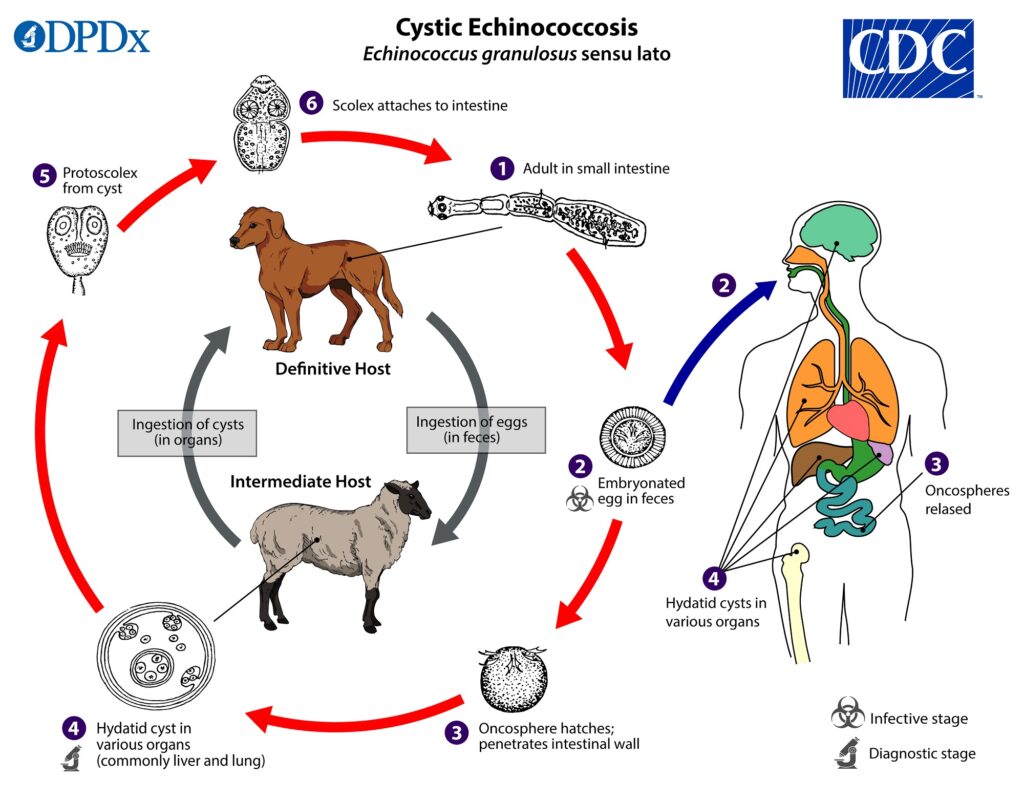
Understanding Echinococcosis
Echinococcosis is a parasitic disease that is caused by infection with the larval stage of tapeworms from the Echinococcus genus. These tapeworms primarily affect the liver and lungs but can also infect other organs such as the heart and brain. Echinococcosis is a zoonotic disease, meaning it can be transmitted from animals to humans. The disease is prevalent in many parts of the world, particularly in rural areas where there is close contact between humans and infected animals.
What is Echinococcosis?
Echinococcosis is a complex disease caused by the larvae of tapeworms. When a person becomes infected, the larvae form cysts that can grow and cause damage to the affected organ. These cysts can contain thousands of tapeworm larvae, and if left untreated, can lead to severe complications or even death. Echinococcosis can present in different forms, with the two most common types being cystic echinococcosis (CE) and alveolar echinococcosis (AE).
Types of Echinococcosis
Cystic echinococcosis (CE) is the most common form of the disease and is caused by the larvae of the Echinococcus granulosus tapeworm. CE primarily affects the liver and lungs, but can also affect other organs. Alveolar echinococcosis (AE), on the other hand, is caused by the larvae of the Echinococcus multilocularis tapeworm. AE is a more aggressive form of the disease and primarily affects the liver, but can also spread to other organs such as the lungs and brain.
Causes of Echinococcosis
Echinococcosis is caused by the ingestion of parasite eggs found in the feces of infected animals, such as dogs and farm animals. These eggs can contaminate the soil, water, or food, and when humans come into contact with these contaminated elements, they can unknowingly swallow the eggs. Once ingested, the eggs hatch in the intestines and release larvae, which then migrate to different organs and form cysts.
Symptoms of Echinococcosis
Symptoms of echinococcosis can vary depending on the type and location of the cysts. In early stages, the disease may be asymptomatic, making it difficult to detect. However, as the cysts grow larger, they can cause symptoms such as abdominal pain, coughing, chest pain, jaundice, fatigue, and weight loss. In some cases, complications can arise if the cysts rupture, leading to allergic reactions, infection, or even anaphylaxis.
Diagnosing Echinococcosis
Early diagnosis of echinococcosis is crucial in order to initiate appropriate treatment and prevent further complications. Several diagnostic methods are used to confirm the presence of the disease.
Medical History and Physical Examination
A detailed medical history and physical examination are the first steps in diagnosing echinococcosis. Your healthcare provider will ask about any symptoms you may be experiencing and inquire about your exposure to animals or regions where the disease is prevalent. During the physical examination, your healthcare provider may feel for any abnormal masses or enlarged organs that could be indicative of the disease.
Imaging Tests
Imaging tests such as ultrasound, computed tomography (CT), and magnetic resonance imaging (MRI) are commonly used to visualize the cysts and determine their location and size. Imaging can also help differentiate between cysts caused by different types of tapeworm larvae. These tests provide valuable information for the diagnosis, monitoring, and planning of treatment.
Laboratory Tests
Laboratory tests play a vital role in the diagnosis of echinococcosis. Blood tests can detect specific antibodies that indicate an ongoing or past infection. Additionally, imaging-guided cyst aspiration can be performed to analyze the fluid and confirm the presence of tapeworm larvae. This procedure is invasive and carries some risks, so it is typically reserved for cases where the diagnosis is uncertain or additional information is needed for treatment planning.
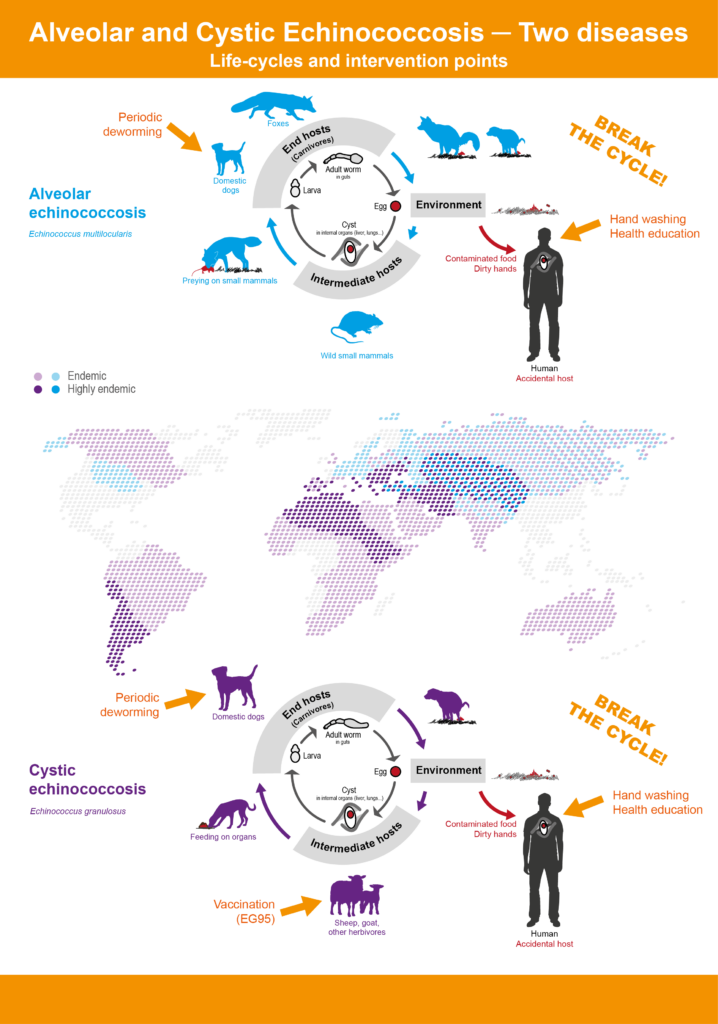
Treatment Options for Echinococcosis
The treatment of echinococcosis depends on several factors, including the type and location of the cysts, the overall health of the patient, and the available resources. Treatment aims to eliminate the tapeworm larvae and prevent further growth or recurrence of the cysts.
Surgical Treatment
Surgical removal of the cysts is often the first-line treatment for echinococcosis. This may involve open surgery, in which the cysts are directly accessed and removed, or minimally invasive techniques such as laparoscopy or thoracoscopy. In some cases, if the cysts are inoperable or too extensive, partial removal or cyst puncture and drainage may be performed to alleviate symptoms.
Drug Treatment
Drug treatment is an essential component of managing echinococcosis. Anti-parasitic drugs, such as albendazole and mebendazole, are used to kill the tapeworm larvae and prevent further growth. These medications are usually given for a prolonged period of several months or even years, depending on the type and severity of the disease. Drug treatment may be used in combination with or as an alternative to surgery, depending on the individual case.
Percutaneous Treatment
Percutaneous treatment techniques, such as percutaneous aspiration, injection, and reaspiration (PAIR), may be considered for certain types of cysts. This minimally invasive approach involves draining the cysts using a needle guided by imaging techniques. A scolicidal agent, such as hypertonic saline or alcohol, is then injected into the cyst to kill any remaining tapeworm larvae. PAIR can be an effective treatment option for selected cases, especially when surgery is not feasible or poses a high risk.
Monitoring and Follow-Up
After treatment, regular monitoring and follow-up are crucial to ensure the effectiveness of the chosen treatment and detect any potential recurrence or complications. This may involve imaging tests, blood tests, and clinical evaluations to assess the response to treatment and make any necessary adjustments.
Living with Echinococcosis: Lifestyle Adjustments
While living with echinococcosis can present challenges, making certain lifestyle adjustments can help manage the disease effectively and improve overall well-being.
Dietary Modifications
A healthy and balanced diet is important for individuals with echinococcosis to support their immune system and aid in the recovery process. It is recommended to consume a variety of nutritious foods, including fruits, vegetables, whole grains, lean proteins, and healthy fats. Your healthcare provider or a registered dietitian can provide personalized dietary recommendations based on your specific needs and any potential dietary restrictions.
Hygiene Practices
Practicing good hygiene is essential to prevent reinfection and to protect others from possible transmission. This includes washing hands thoroughly with soap and water after using the bathroom, before preparing or consuming food, and after contact with animals or potentially contaminated surfaces. Avoiding close contact with infected animals and their feces and regularly cleaning and disinfecting living areas can also help reduce the risk of exposure.
Physical Activity and Exercise
Engaging in regular physical activity within the limits of your condition can have numerous benefits. Exercise can help improve overall fitness, boost mood, and alleviate symptoms such as fatigue and muscle weakness. It is important to consult with your healthcare provider before starting or modifying any exercise routine to ensure it is safe and appropriate for your individual case.
Travel Considerations
If you have echinococcosis, it is important to take certain precautions when traveling, particularly to regions where the disease is endemic. This may include avoiding contact with animals, drinking only safe and clean water, consuming well-cooked foods, and practicing good personal hygiene. It is advisable to consult with your healthcare provider or a travel medicine specialist for specific recommendations before embarking on any travel plans.
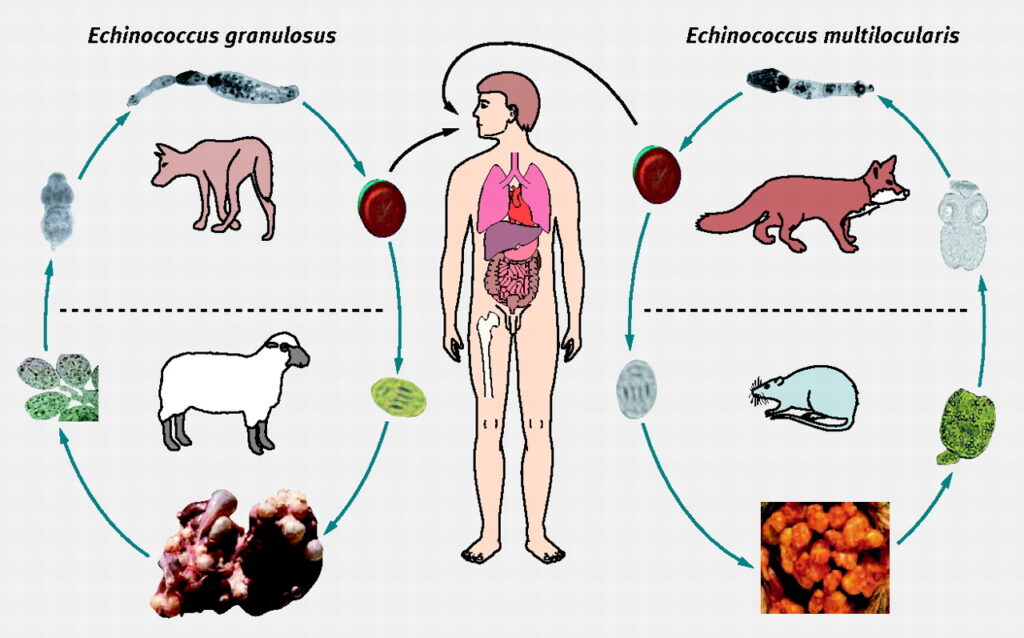
Managing Medications for Echinococcosis
Medication management is a crucial aspect of living with echinococcosis and ensuring the effectiveness of the prescribed treatment.
Understanding Your Medications
It is important to have a good understanding of the medications prescribed for echinococcosis, including their purpose, dosages, and potential side effects. Take the time to discuss any concerns or questions with your healthcare provider or pharmacist, and follow their instructions carefully.
Taking Medications as Prescribed
Adherence to the prescribed medication regimen is essential for successful treatment. Take your medications exactly as directed by your healthcare provider, and do not skip doses or discontinue treatment without their approval. It may be helpful to set reminders or incorporate medication-taking into your daily routine to ensure consistency.
Dealing with Side Effects
Some medications used to treat echinococcosis can cause side effects. Common side effects may include nausea, vomiting, abdominal discomfort, and dizziness. If you experience any side effects that are bothersome or persistent, it is important to inform your healthcare provider. They may be able to offer strategies to manage or alleviate these side effects.
Keeping track of Medications
Keeping track of your medications can help ensure that you take them consistently and avoid missing doses. This can be done through the use of medication reminder apps, pill organizers, or by maintaining a medication journal. It is important to have an up-to-date list of all your medications, including dosages and any other pertinent information, in case of emergencies or when interacting with healthcare professionals.
Emotional Support and Mental Health
Dealing with a chronic illness such as echinococcosis can take a toll on your emotional well-being. Seeking emotional support and taking care of your mental health are important components of managing the disease effectively.
Seeking Professional Help
If you are experiencing difficulties coping with the challenges of living with echinococcosis, it can be beneficial to seek professional help. Mental health professionals, such as psychologists or counselors, can provide guidance, support, and strategies to help you navigate the emotional aspects of the disease.
Joining Support Groups
Connecting with others who are also living with echinococcosis can provide a sense of belonging and understanding. Support groups, whether in-person or online, can offer a safe space to share experiences, gather information, and exchange coping strategies. Your healthcare provider or local community organizations may be able to provide information on available support groups.
Coping Strategies
Developing coping strategies can help you manage the challenges and uncertainties associated with echinococcosis. These can include relaxation techniques, such as deep breathing or meditation, engaging in hobbies or activities that bring you joy, maintaining a positive outlook, and seeking support from loved ones. It is important to explore different strategies and find what works best for you.
Family and Friends’ Support
The support of family and friends can play a crucial role in helping you cope with echinococcosis. Open and honest communication with your loved ones about your condition and the challenges you may face can foster understanding and empathy. Sharing your feelings and seeking their support when needed can provide a valuable source of strength.
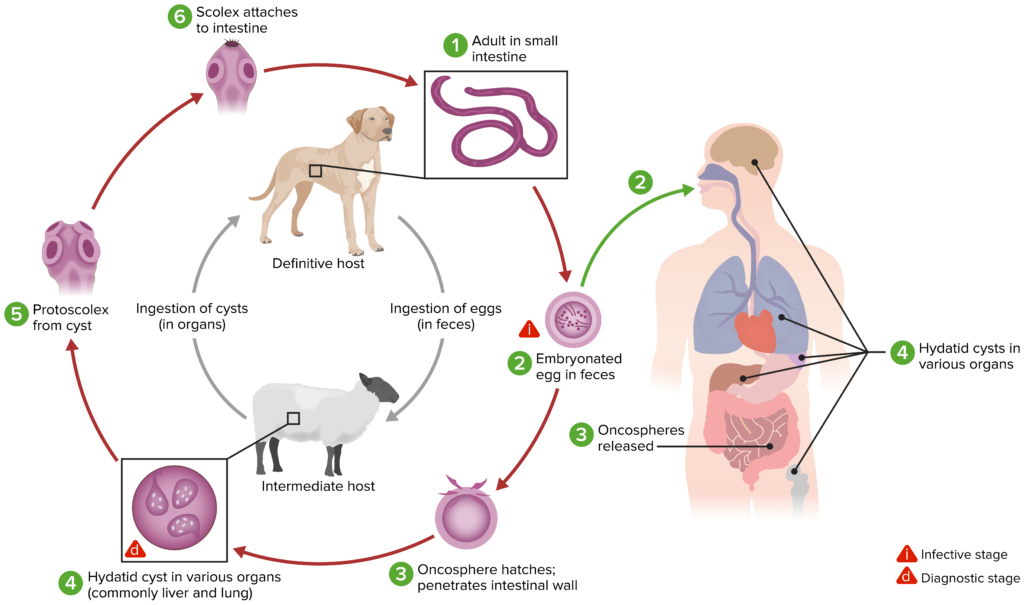
Preventing Echinococcosis: Tips for a Healthy Lifestyle
Prevention is key in reducing the risk of echinococcosis. By adopting certain habits and practices, you can minimize the chances of contracting the disease.
Good Hygiene Practices
Practicing good personal hygiene is essential in preventing echinococcosis. This includes regular handwashing with soap and water, especially before eating or preparing food, after using the bathroom, and after any contact with animals or potentially contaminated surfaces. Encouraging good hygiene practices in children is also important, as they may be more susceptible to infection due to their frequent contact with animals and their environment.
Avoiding Contact with Dogs and Farm Animals
Dogs, particularly those in endemic areas, are the primary hosts for the Echinococcus tapeworms. Avoiding contact with stray or wild dogs, as well as with farm animals such as sheep and cattle, can significantly reduce the risk of infection. It is also important to teach children to avoid contact with unfamiliar animals and to always wash their hands thoroughly after interacting with pets.
Properly Cooking and Cleaning Foods
Properly cooking foods, especially meat, is crucial in preventing echinococcosis. Cooking at temperatures that exceed 60°C (140°F) for a sufficient period of time can effectively kill the tapeworm larvae. It is also important to wash fruits and vegetables thoroughly before consumption, particularly if they come from regions where echinococcosis is prevalent.
Regular Deworming for Pets
Regular deworming of pets, particularly dogs, is an important preventive measure. Consult with a veterinarian to establish an appropriate deworming schedule for your pets and ensure that the medications used are effective against Echinococcus tapeworms. Keeping your pets healthy and free from parasites contributes to a safer environment for both humans and animals.
Educating Others about Echinococcosis
Raising awareness about echinococcosis is essential in preventing the spread of the disease and ensuring early detection and treatment for those affected. As someone living with or affected by echinococcosis, you can play an active role in educating others about the disease.
Raising Awareness in Your Community
Organizing events, such as health fairs or educational talks, can help raise awareness in your community. Collaborate with local healthcare organizations, schools, and community centers to spread information about echinococcosis, its risk factors, and preventive measures. Distributing educational materials and engaging with community members can make a significant impact in increasing knowledge and promoting prevention.
Educating Friends and Family
Take the opportunity to educate your friends and family members about echinococcosis. Being informed can help them understand the importance of good hygiene practices, avoiding contact with potentially infected animals, and seeking prompt medical attention if they develop any concerning symptoms. By sharing your personal experience with the disease, you can create a better understanding and help protect your loved ones.
Engaging with Healthcare Professionals
Actively engaging with healthcare professionals, such as your primary care provider or specialists, can contribute to the overall management of echinococcosis. Ask questions, seek guidance, and stay informed about the latest research and treatment options. By being an active participant in your own healthcare, you can ensure that you receive the best possible care and support.
Supporting Research and Advocacy Organizations
Supporting research and advocacy organizations dedicated to echinococcosis can make a significant impact on the continued advancement of knowledge and resources. Donating, volunteering, or participating in fundraising events can help fund research studies, enhance awareness campaigns, and support affected individuals and their families.
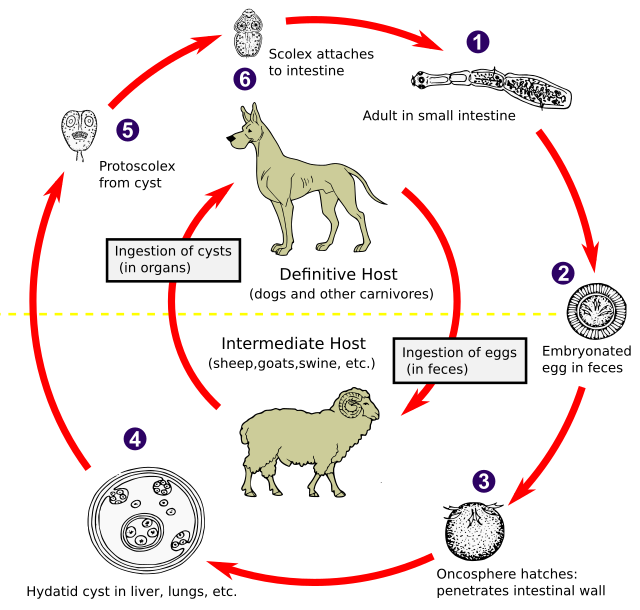
Planning for the Future: Long-Term Perspective
Living with echinococcosis requires a long-term perspective and planning to ensure the best possible outcomes and quality of life.
Long-Term Treatment Goals
Work with your healthcare provider to establish long-term treatment goals that are specific to your condition and circumstances. These goals may include preventing cyst growth, minimizing symptoms, managing potential complications, and maintaining a good quality of life. Regular monitoring and follow-up appointments will help track progress towards these goals and make any necessary adjustments to the treatment plan.
Monitoring Your Condition
Regular monitoring of your condition is vital in the long-term management of echinococcosis. This may involve periodic imaging tests, blood tests, and clinical evaluations to assess the stability of the cysts, evaluate treatment efficacy, and detect any possible recurrence or complications. Stay in close communication with your healthcare provider and report any changes or concerns promptly.
Adjustments for Life Events
Life events, such as planning a pregnancy, undergoing surgery, or starting new medications, may require adjustments in your echinococcosis treatment plan. It is important to inform all healthcare providers involved in your care about your condition and any specific precautions or considerations that need to be taken. Working collaboratively with your healthcare team ensures that the necessary modifications are made to optimize your health and well-being.
Financial Planning
Managing a chronic illness like echinococcosis involves financial considerations. Medical expenses, including consultations, medications, imaging tests, and procedures, can add up over time. It is important to plan and budget for these expenses, explore potential insurance coverage or government assistance programs, and seek financial advice if needed. Proactive financial planning can alleviate some of the burdens associated with the costs of managing the disease.
Research and Advances in Echinococcosis
Ongoing research studies and advances in the field of echinococcosis continue to improve our understanding and management of the disease.
Current Research Studies
Researchers around the world are conducting studies to further our understanding of echinococcosis. These studies may focus on topics such as the development of new diagnostic tools, treatment modalities, and preventive strategies. Participating in research studies, if available and appropriate, can contribute to scientific knowledge and potentially provide access to innovative treatments or interventions.
Promising Treatments in Development
Advances in treatment options for echinococcosis are being explored. Researchers are investigating new medications and treatment strategies to improve outcomes, reduce side effects, and enhance overall success rates. These developments offer hope for individuals living with echinococcosis and may provide alternative treatment options in the future.
Genetic Studies and Future Directions
Genetic studies are shedding light on the genetic diversity of the Echinococcus tapeworms and their various strains. This knowledge can help improve our understanding of disease transmission, virulence, and treatment response. It may also pave the way for personalized medicine approaches and the development of targeted therapies tailored to specific strains or genetic characteristics.
Impact of Global Health Initiatives
Global health initiatives focusing on neglected tropical diseases, including echinococcosis, are playing a crucial role in raising awareness, improving access to healthcare, and enhancing research efforts. These initiatives aim to reduce the burden of the disease worldwide and ensure that individuals affected by echinococcosis receive appropriate care and support.
In conclusion, understanding echinococcosis is essential for effectively managing the disease and minimizing its impact on your daily life. By educating yourself and others, following recommended treatment options, and making necessary lifestyle adjustments, you can enhance your overall well-being and contribute to the prevention and control of echinococcosis. Remember to stay in close communication with your healthcare provider, seek support when needed, and stay proactive in managing your condition. With proper care and management, individuals living with echinococcosis can lead fulfilling lives and maintain good health.